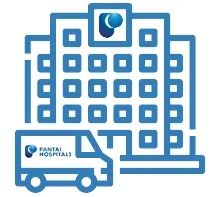What is the function of the thyroid gland?
The thyroid gland is a small butterfly-shaped gland located in front of the trachea in the neck. The thyroid gland produces hormones triiodothyronine (T3) and thyroxine (T4), that regulate how the body utilises energy. Therefore, these hormones affect most organs in your body, including your heartbeat.
The pituitary gland, located just below the brain, regulates thyroid function. The thyroid is stimulated by the thyroid-stimulating hormone (TSH), which is produced by the pituitary to create T3 and T4.
What is hypothyroidism?
Hypothyroidism occurs when your thyroid gland is unable to produce enough thyroid hormone and is the most common thyroid disorder. The condition is also known as an underactive thyroid.
When there is an underproduction of thyroid hormones in your body, some bodily functions may be affected.
Is hypothyroidism same as hyperthyroidism?
Although both are thyroid disorders, hypothyroidism is different from hyperthyroidism. Hypothyroidism is a condition of underactive thyroid, whereas hyperthyroidism is a condition of overactive thyroid.
Below are the differences for both thyroid disorders:
| Hypothyroidism (underactive thyroid) | Hyperthyroidism (overactive thyroid) |
|---|---|
| Under production of thyroid hormone | Too much thyroid hormones |
| Cold intolerance | Heat intolerance |
| Weight gain | Weight loss |
| Decreased heart rate | Increased heart rate |
| Constipation | Diarrhoea |
| Hypoactivity | Hyperactivity |
What are the symptoms of hypothyroidism?
Usually, symptoms develop gradually, and you may not realise you have had hypothyroidism for several years.
- Tiredness
- Weight gain
- Constipation
- Decreased sweating and dry skin
- Facial swelling
- Sensitive to cold
- Muscle weakness or aches
- Irregular and heavy menstrual cycles
- Muscle cramps
- Slowed heart rate
- Brittle nails and hair
- Depression
- Mild high blood pressure
- Shortness of breath with exercise
- Hoarseness of voice
What are the causes of hypothyroidism?
An underactive thyroid (hypothyroidism) is characterised by insufficient thyroxine production by the thyroid gland (T4).
The majority of hypothyroidism cases are caused by the immune system attacking and damaging the thyroid gland or as a result of treatment for thyroid cancers.
- Immune system
- The immune system, which typically counters infection, attacks the thyroid gland, resulting in hypothyroidism, and this causes the thyroid to be unable to produce sufficient amounts of T4.
- Hashimoto's disease is the most prevalent type of autoimmune reaction that results in an underactive thyroid.
- Although it is unclear what causes Hashimoto's disease, it is genetically inclined. It is also commonly seen among those with other types of immune system disorders, such as vitiligo and Type 1 Diabetes.
- Previous thyroid treatment
- Surgery or radioactive iodine
- Usually, treatments done for hyperthyroidism (too much hormone) or thyroid cancer.
- Other causes:
- Lack of dietary iodine
- Congenital hypothyroidism where a baby is born with an underactive thyroid, as the thyroid gland is not well developed
- Damage to the pituitary gland
- Medications such as lithium, amiodarone, or interferons
What are the risk factors for hypothyroidism?

Some of the risk factors of hypothyroidism include:
- A family history of thyroid disease
- Being a woman
- Older than 60
- Autoimmune diseases, such as Type 1 Diabetes or celiac disease
- Have been treated with radioactive iodine or anti-thyroid medications
- Previous history of thyroid surgery or treatment for thyroid cancer
- Pregnancy
What are the complications of hypothyroidism?
If left untreated, hypothyroidism may lead to:
- Heart problems due to an increased level of cholesterol in your blood
- Goitre, which is a swelling or lump at the front of the neck due to an enlarged thyroid gland
- Pregnancy complications
- Pre-eclampsia – can cause high blood pressure and fluid retention in the mother and lead to serious complications for the mother and baby
- Anaemia in the mother
- Birth defects
- Underactive thyroid in the baby
- Mental and physical developmental problems with the baby
- Postpartum haemorrhage
- Miscarriage or postpartum bleeding
- Myxoedema coma, which is a rare, life-threatening condition with extremely low thyroid hormone levels causing drowsiness, confusion, and hypothermia. This condition requires emergency treatment at the hospital.
How is hypothyroidism diagnosed?
It is crucial to diagnose underactive thyroid as soon as possible. Diagnosis is made based on various investigations. Your doctor would first question your general health, symptoms and conduct a thorough physical examination.
Thyroid function test
- Thyroid function test is a blood test that measures your hormone levels.
- This test looks at the levels of thyroid-stimulating hormone (TSH) and thyroxine (T4) in your blood.
- High TSH levels and low T4 levels in the blood may mean that you have an underactive thyroid.
- High TSH levels but normal T4 may indicate you may be at risk of developing underactive thyroid in the future.
- TSH levels play an important role in managing hypothyroidism. It helps your doctor determine the right dosage of medication needed initially and over time.
How is hypothyroidism treated?
Hypothyroidism treatment aims to normalise blood levels of thyroid-stimulating hormone (TSH) and thyroxine (T4) as well as to alleviate symptoms.
- Medication
- Thyroid replacement therapy
- Levothyroxine replaces the thyroxine hormone
- You may initially be started on a low dose of levothyroxine and increased gradually
- A blood test would be done to monitor your hormone levels
Book an appointment at Pantai Hospitals
Hypothyroidism is a common disorder and can be treated with proper management. If you have symptoms mentioned above, do seek medical attention to rule out any serious medical condition.
Early detection of hypothyroidism makes treating the condition easier with effective and appropriate treatment. The caring and multidisciplinary team of healthcare professionals are available for consultation and to provide the best care.
Get in touch with us to book an appointment today. We assure you the best possible care tailored to your specific needs.
Pantai Hospitals have been accredited by the Malaysian Society for Quality in Health (MSQH) for its commitment to patient safety and service quality.
References
Ross DS. Patient education: Hypothyroidism (underactive thyroid) (Beyond the Basics). In: UpToDate, Shefner JM (Ed), UpToDate, Waltham, MA. [Accessed on 15 December 2022]
Diagnosis - Underactive thyroid (hypothyroidism). Available at https://www.nhs.uk/conditions/underactive-thyroid-hypothyroidism/diagnosis/ Diagnosis - Underactive thyroid (hypothyroidism)


 Request an Appointment
Request an Appointment.webp?sfvrsn=276ce14_1/vector-(3).webp) International Patient
International Patient

.webp)

 Find A Doctor
Find A Doctor



.webp?sfvrsn=20763f7d_21)
.webp?sfvrsn=f2a2c343_12)





